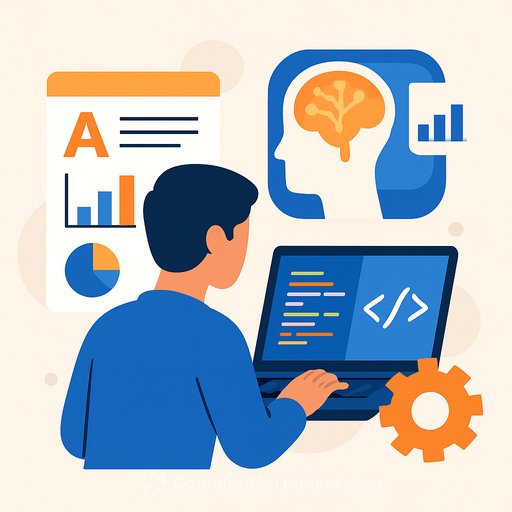The MBA That Learns to Think: How IIM Ahmedabad Is Blending Management with AI
IIM Ahmedabad has introduced India's first Blended MBA in Business Analytics & Artificial Intelligence. It signals a clear shift: management can't sit apart from technology anymore. Judgment still matters, but the foundation is now data, models, and measurable outcomes.
The demand is simple. Managers must read markets and interpret models, think strategically, and know how algorithms make predictions. AI has moved from the lab to the boardroom-into product design, risk, supply chains, and customer insight. That changes how we teach leadership, and how we practice it.
What This Means for Managers
Leadership now involves fluency in the logic of algorithms, not just familiarity with dashboards. You don't need to be a programmer, but you do need to interrogate data, spot bias, test assumptions, and translate analysis into decisions people can act on.
As Dr. Tanya Singh puts it, "The shift to teaching business analytics and AI indicates that Indian business schools are adapting to the new global reality: leadership now requires a strategic vision for operating in conjunction with technology."
Inside the New Classroom
The new structure looks less like a seminar room and more like a lab. Students work with real datasets, simulation tools, and live industry projects. They learn to detect bias, test models, and-crucially-know when to question them.
The MBA is moving from case study to code literacy. The aim isn't to turn managers into engineers, but to make them fluent in the logic behind the models so they can link human judgment with machine precision. "The MBA 30-Minute AI Certification Program provides a fast, meaningful summary of arguments and concepts relating to artificial intelligence for business," adds Singh.
The Changing Shape of Management Disciplines
Finance now includes predictive models and algorithmic forecasting. Marketing has shifted from segmentation to data-led personalization. Strategy is becoming a system of continuous simulation and adaptation, not quarterly reviews.
AI isn't replacing management theory-it's turning it into an evidence-based system that ties decisions to measurable outcomes. Managerial judgment is becoming hybrid: part instinct, part model. The work is deciding when to trust the data and when to override it.
Professor Kakoli Sen notes, "With time and the changing requirements and demands of the market and industry, management education has taken a 360-degree turn, leaning more towards technology, AI-driven innovation, and digital transformation."
The Global Context-and the Indian Difference
Leading global schools have already embedded AI into their MBA structures, including programs at MIT Sloan and Stanford GSB. IIM Ahmedabad joins that conversation with a model built for India's scale and diversity.
India's digital economy generates massive consumer and transaction data. That creates a testing ground for AI-led management-where inclusion, efficiency, and cost discipline must coexist. The result: managers who speak two languages-business and data. They won't always code, but they will question.
How IIM Ahmedabad Is Structuring It
- Blended format for working professionals; learning stays continuous, not one-off.
- Live industry projects and modular courses to keep pace with real market needs.
- Classroom-to-boardroom linkage: model testing, bias detection, interpretation, and decision-making.
Practical Playbook for Management Teams
- Set your literacy baseline: every manager should understand how models are trained, validated, and monitored. No coding required-just logic and accountability.
- Run model audits: check for bias, drift, and overfitting. Ask for error rates, confidence intervals, and counterfactuals before approving rollouts.
- Pick one high-impact pilot per function: e.g., demand forecasting in supply chain, churn risk in customer success, or pricing in finance. Measure lift against a clear control.
- Align incentives: tie bonuses to both outcome metrics (revenue, cost, NPS) and model governance metrics (data quality, audit completeness, incident response).
- Build a small internal AI council: product, data, legal, risk, and operations. Meet monthly. Approve models, review incidents, and publish decisions.
- Upgrade data foundations: define owners, retention windows, access policies, and feedback loops. Poor data beats fancy models every time-in the worst way.
- Upskill managers quarterly: 2-4 hour sprints on topics like bias, experimentation, prompt strategy, and model limitations.
Skills That Matter Now
- Experimental thinking: A/B tests, control groups, and how to read uplift.
- Interpretability: knowing when a model's explanation is useful-and when it's a crutch.
- Causal sense: correlation is a clue, not a conclusion.
- Ethics and risk: consent, privacy, audit trails, and accountability lines.
- Communication: turning outputs into decisions people can execute.
Next Steps for You
- Pick one business question your team debates often. Frame it as a modelable problem. Define the data you have, the data you need, and the decision gate.
- Schedule a monthly "model review hour" with your leads. Treat it like a financial review-regular, disciplined, and tied to outcomes.
- Level up your team's AI literacy with short, applied training. See curated options by role at Complete AI Training or explore focused certifications for automation and analysis at Popular AI Certifications.
The Bottom Line
The MBA that learns to think meets a market that demands the same from its managers. Data informs; judgment decides. The advantage goes to leaders who can question models with clarity, connect insights to incentives, and turn analysis into action.
Your membership also unlocks:






